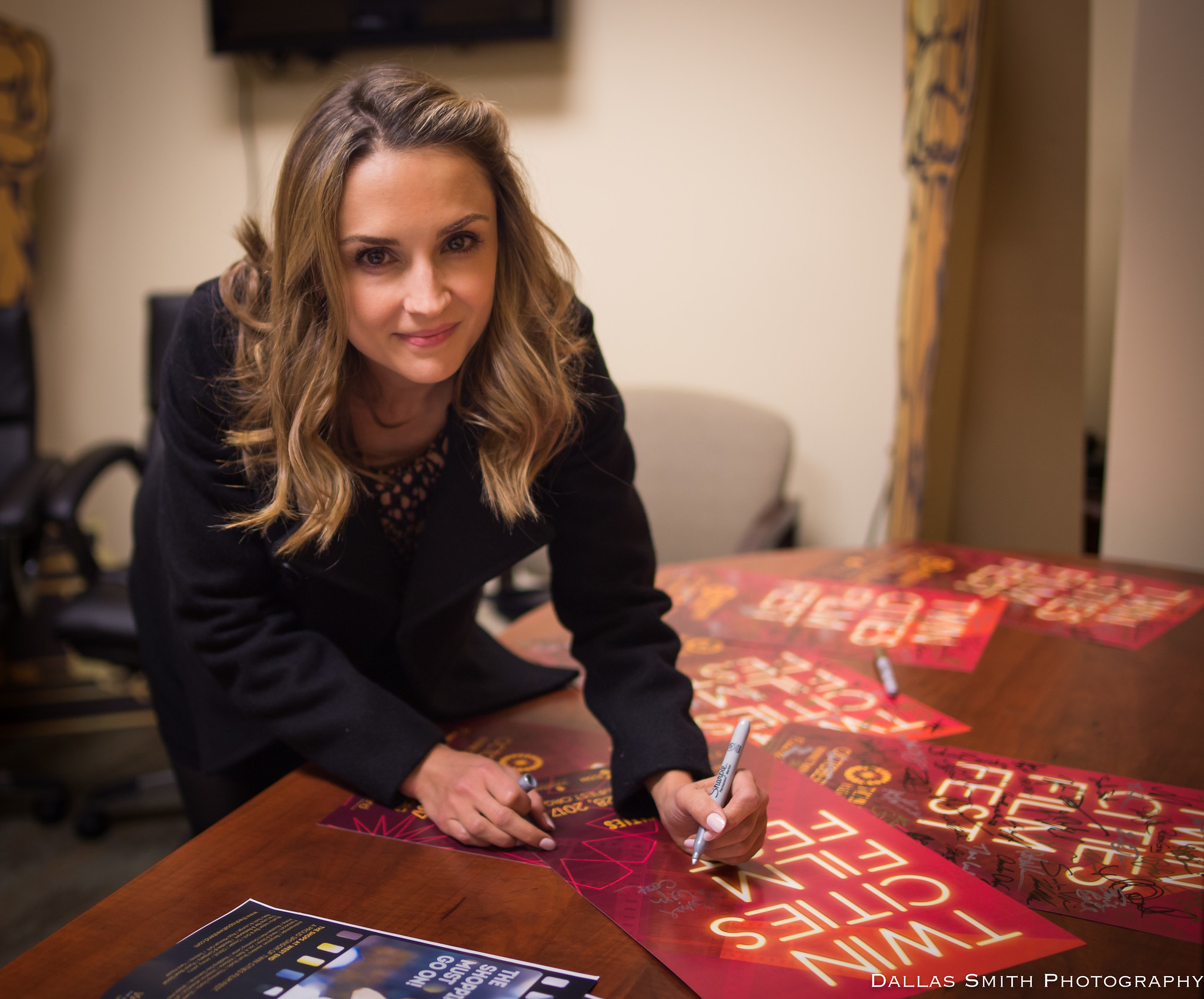
Dallas Smith Photography, courtesy Twin Cities Film Fest
In the montage of Jatin Setia’s life, his enamoration with movies would be there from the beginning. When he was a child in New Delhi, Bollywood was so big—the music, the fights, the emotion—that going to the movie theater was an escape from the ordinary into a world where anything could happen. When the family moved to Jackson, Mississippi, in 1991, Setia again used movies as an escape, this time from loneliness. Movies became both a reprieve and an instruction on English’s nuances, and they helped him connect with his peers.
Eventually, Setia’s love for films faded into the background to make room for his career aspirations. During high school, he wanted to be a doctor, so he attended college at the University of Minnesota Twin Cities to be near the Mayo Clinic. He didn’t end up pursuing that path, but he did stay in the North Star state and became a data analyst. While he liked his job fine, when he was laid off in 2008, he decided to take some time and figure out what would truly make him happy. Enter the Twin Cities Film Fest (TCFF), his idea to bring nationally renowned independent American films to the region.
Over the past nine iterations of the Twin Cities Film Fest, he and his team have grown the festival from four days to 11, from 30 films to 120, and from 800 people from their personal and professional networks to 15,000 friends and strangers alike. Here are five things you need to know about TCFF’s 10th anniversary, which runs from October 16-26 at the ShowPlace ICON in St. Louis Park:

Dallas Smith Photography, Courtesy Twin Cities Film Fest
1. Unsurprisingly, this year’s Twin Cities Film Fest is the biggest yet (with a special surprise for Prince lovers).
In case you’re not familiar with TCFF, like other film festivals, its feature and short film screenings are all premieres that are not in theaters or available to the general public. That means that when you see one of the award-contending films, you might be watching the next Green Book or Moonlight—both of which, coincidentally, also premiered at TCFF before they won their Oscars for Best Picture.
Of the more than 600 submissions, film festival curations, and movie studio discussions, approximately 120 feature and short films will be shown at this year’s event, with more than 60 percent of these helmed by a woman director or producer. For those who live to dive a little deeper into movies, about 70 percent of the screenings include a talk afterward with a cast or crew member or a relevant local organization.
To kick off the festival on October 16 are two movies: the award-contending Jojo Rabbit, a daring Holocaust dramedy by Taika Waititi, and Working Man, a drama about a man trying to save his Rust Belt town’s factory. The latter stars Peter Gerety (The Wire) and Talia Shire (The Godfather: Part II, Rocky), who will both be in attendance. Other highlights of the festival include Inside the Rain (with stars Rosie Perez and Eric Roberts in attendance, October 18), Honey Boy (with director Alma Har’el in attendance, October 21), and Premature (with director Rashaad Ernesto Green in attendance, October 26).
This year, the TCFF staff has added another special showing for a different milestone: the 35th anniversary of Purple Rain. To mark the occasion, there will be a free screening (make sure to reserve your seats), a Prince after-party, and a post-film talk by director Albert Magnoli, his first since the film came out in 1984.
2. TCFF’s social justice cause of the year is environmental responsibility.
From the get-go, TCFF has had a yearly social justice cause; Setia and his team see it as their responsibility as storytellers. Over the past nine years, audiences have watched documentaries on education, bullying, hunger prevention, poverty, homeless youth, sex trafficking, addiction, veteran support, animal humanity, and this year, they will dive deeper into environmental responsibility.
The topic first started with the idea of environmentalism in general. “The majority of my staff here, we’ve been together for a long time, and since we’ve been together, some of us have gotten married and had kids,” Setia says. “So as we look to the next decade of our existence, we couldn’t help but think about our kids and what they’re going to experience from our eyes and what we’ll experience through theirs.”
The environment, climate change—the topics encompassed so much that they had to narrow it down more, choosing to focus on films that showed tangible actions people were taking, not only to help the environment but also themselves. Check out the six films of the series, which cover the country’s electrical grid, dumpster salvaging, food co-ops, and more. For some local inspiration, read up on Irsa Hirsi and Rose Whipple, the two youth activists who won the changemaker of the year awards at TCFF’s gala in September.

Dallas Smith Photography, courtesy Twin Cities Film Fest
3. For founder Jatin Setia, it’s not only about the movies; it’s the whole group experience.
I’ll let Setia speak for himself here: “The filmgoing experience has been a big key and my driving force in the festival,” he says. “I saw the economic disparity in India, but then the lights went down and everyone was equal. You had the same rupees that I had to sit next to me or in front of me or behind me. I don’t know who you are, and we’re sitting here and watching the same thing, laughing at the same thing, crying at the same thing, or dancing because we both know this Bollywood number. Only when we come outside of the theater is when you go off in the limo by yourself or the rickshaw, or you are literally that guy that I passed on the side of the street with a homeless sign. In the movie theater, when the lights go down, everyone’s equal.”
4. From the start, it’s been the same executive staff.
TCFF’s success has been all about scaling and finding the right people to partner with, according to Setia, just like it has been from the beginning. In 2009, Setia began the formal process of creating TCFF as a 501c3 nonprofit, and over the next year, gathered the rest of the executive team: managing director Bill Cooper, artistic director Steve Snyder, festival manager Naomi Dahlgren, and development director Danielle Palmer. They and the festival’s earliest supporters latched on not only to the idea but Setia’s perceived management skills and business acumen.
“When I first started, it was just me,” Setia says. “People were buying how I was presenting myself. People were buying my business background, even though it had nothing to do with the festival. … They were buying my honesty, truthfulness, and good intentions. It’s the same now. It doesn’t change, except for the fact that now I have a deck to present them with stats, with our history, with our growth.”
Similar to almost any story of success, earnest responses like this never seem to satisfactorily depict the long hours (the day of this 9 a.m. interview, Setia only left the office 3 a.m. the night before) and the uncertainties the staff faces. But really, every battle is par for the course, and the victories continue pushing them onward to the next one. The first time an Academy-nominated actor attended a screening; when studios began approaching them to submit; the honor and humility that Minnesota actor John Hawkes (Deadwood, Winter’s Bone, The Sessions) displayed when he received a Twin Cities Film Fest award; even people’s smiles as they leave the theater: Those are the moments that keep them going.

5. While TCFF shows films from all over the country, it cherishes its connections to Minnesota.
“Supporting Minnesota filmmakers and Midwest filmmakers is really at the core of our organization,” says Cooper, who has been on the film scene for more than 35 years. Because of his experience, he has not only helped create the grassroots fanbase for the festival, but he knows the community inside and out. “It’s not just about exhibition although a third of our films have some sort of Minnesota connection. … For us we try, even if it’s just for an evening, to take the film industry people here in Minnesota and make them feel like rockstars because they are.”
TCFF’s support for the filmmakers goes beyond just the glam and general community support. This spring, TCFF founded a production services agency to help connect local filmmakers with local businesses, and 10 clients have already received videos for social media, commercials, and other marketing material. In the future, Setia hopes to be able to provide work space for creatives in the film industry. With the success of the first 10 years of TCFF, who knows what the next decade will bring?






